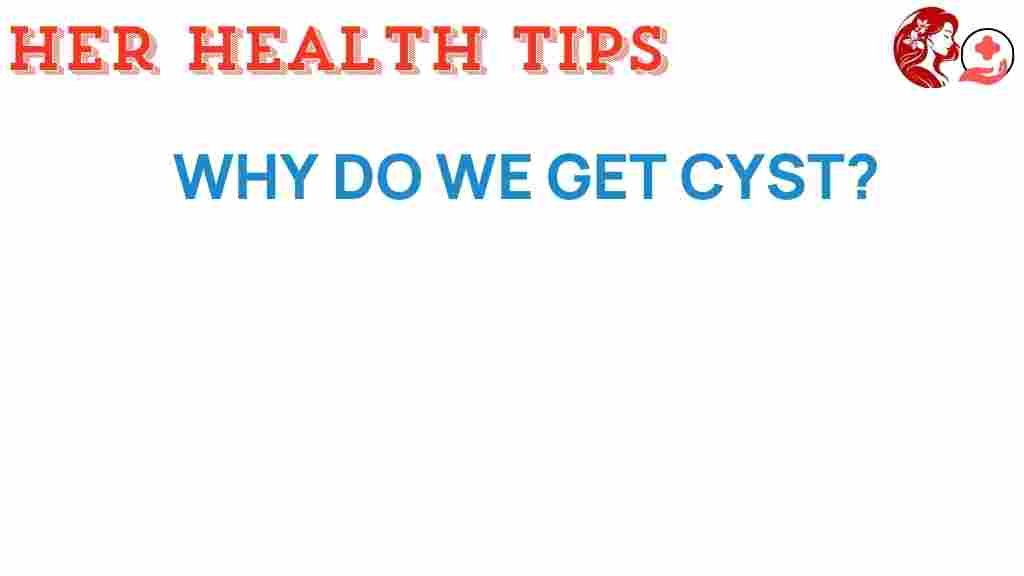Unraveling the Mystery: Why Do We Develop Cysts?
Cysts are fluid-filled sacs that can develop in various tissues throughout the body. While they are often harmless, understanding the health implications, causes, symptoms, treatment options, and ways to prevent cyst formation is crucial for overall wellness. In this article, we will delve into the mystery of cysts, providing valuable medical insight to empower you in managing your health.
What Are Cysts?
A cyst is a closed sac-like structure that can form in different parts of the body. Cysts can vary significantly in size, shape, and content. They can be filled with air, fluid, or semi-solid material. While most cysts are benign and do not require medical attention, some can cause discomfort or signal underlying health issues.
Common Types of Cysts
There are several types of cysts, including:
- Epidermoid Cysts: Often found on the skin, these are small, slow-growing lumps filled with keratin.
- Dermoid Cysts: These can contain hair, skin, or teeth and are usually present at birth.
- Ovarian Cysts: Fluid-filled sacs on the ovaries, common in women of childbearing age.
- Ganglion Cysts: These occur near joints or tendons, often on the wrist or hand.
- Baker’s Cysts: Found behind the knee, these are filled with synovial fluid and can cause swelling and discomfort.
Health Implications of Cysts
Understanding the health implications of cysts is essential. While many cysts are asymptomatic and harmless, some can lead to complications, particularly if they grow large or become infected. It’s important to monitor symptoms and seek medical advice when necessary.
Causes of Cysts
The exact causes of cysts can vary greatly depending on the type, but some common factors include:
- Blocked Ducts: Many cysts form due to the blockage of ducts in the body, preventing normal fluid drainage.
- Infections: Certain infections can lead to the formation of cysts as the body responds to inflammation.
- Genetics: Some individuals may be genetically predisposed to develop specific types of cysts.
- Chronic Inflammation: Conditions that cause ongoing inflammation can increase the likelihood of cyst development.
- Hormonal Changes: Hormonal fluctuations, such as those during the menstrual cycle, can lead to the formation of ovarian cysts.
Symptoms of Cysts
Cysts often do not produce noticeable symptoms, but when they do, symptoms can include:
- Swelling or lump in the affected area
- Pain or discomfort, particularly if the cyst is pressing on nearby structures
- Redness or warmth if the cyst becomes infected
- Changes in urinary or bowel habits if the cyst is located near vital organs
- Menstrual irregularities in the case of ovarian cysts
Treatment Options for Cysts
When it comes to treating cysts, the approach largely depends on their type, size, and symptoms. Here are some common treatment options:
Observation
If a cyst is small and asymptomatic, a healthcare provider may recommend simply monitoring it over time. Regular check-ups can help ensure it does not grow or cause problems.
Medications
For symptomatic cysts, medications may be prescribed to alleviate pain or inflammation. Antibiotics may be necessary if an infection occurs.
Drainage
In some cases, a cyst can be drained by a healthcare provider to relieve pressure or discomfort. This is often done with a needle or small incision.
Surgical Removal
If a cyst is large, recurrent, or causing significant symptoms, surgical removal may be the best option. This is typically done as an outpatient procedure.
Prevention of Cysts
While not all cysts can be prevented, there are steps you can take to reduce the risk:
- Maintain Good Hygiene: Keeping the skin clean can prevent infections that may lead to cyst formation.
- Manage Hormonal Health: For women, maintaining hormonal balance through a healthy lifestyle may help prevent ovarian cysts.
- Stay Hydrated: Proper hydration supports the body’s natural detoxification processes.
- Regular Check-ups: Routine medical examinations can help catch potential issues early on.
- Healthy Diet: A balanced diet rich in vitamins and minerals supports overall wellness and may reduce inflammation.
Medical Insight on Cysts
Healthcare professionals emphasize the importance of understanding the nature of cysts. While many are benign, it’s crucial to seek medical advice when you notice unusual lumps or persistent pain. Diagnostic imaging, such as ultrasounds or MRIs, can provide valuable information about the cyst’s characteristics and guide treatment decisions.
Troubleshooting Common Concerns
If you suspect you have a cyst or are dealing with one, consider the following troubleshooting tips:
When to Seek Medical Help
- If you experience sudden swelling or sharp pain
- If the cyst becomes red, warm, or painful, indicating a possible infection
- If you notice changes in bowel or urinary habits
- If you have a family history of cysts or related conditions
Managing Symptoms at Home
For mild discomfort associated with cysts, you may consider the following home remedies:
- Warm Compress: Applying a warm compress can help alleviate pain and promote drainage.
- Over-the-Counter Pain Relief: Ibuprofen or acetaminophen can help manage pain and reduce inflammation.
- Rest: Avoiding strenuous activities may prevent further irritation of the cyst.
Conclusion
Understanding why we develop cysts is essential for managing our health effectively. While cysts can be benign and asymptomatic, awareness of their causes, symptoms, treatment options, and preventive measures is vital for maintaining wellness. Regular check-ups and open communication with healthcare providers can ensure that any concerns are addressed promptly. If you want to learn more about health and wellness, visit Healthline for comprehensive resources.
Staying informed is your best defense against health issues, including cysts. Remember, your health is your wealth, and taking proactive steps can lead to a healthier, happier life.
This article is in the category Conditions and created by HerHealthTips Team
